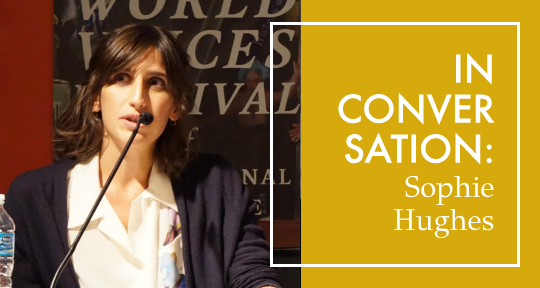A few months back, I read Fernanda Melchor’s Temporada de huracanes in its original Spanish in only two short sittings. The Mexican author’s breathless prose almost demands this; putting the book down feels like walking away from a friend who is ripping you, between gasps, through one of the most harrowing stories you’ve ever heard. Among the myriad feelings I had on finishing the book was a combination of pity and excitement for the poor but lucky soul that would translate it. Perhaps you’ve already heard the list of Melchor’s stylistic choices: endlessly winding sentences, paragraphs that last chapters, and a slew of slang that even some Mexicans might need to ask their filthiest-mouthed friend to translate from Spanish into Spanish. Happily, in the end, it was Sophie Hughes, Fitzcarraldo Editions, and New Directions who brought this torrential narrative downpour to English readers, giving it the carefully considered translation it deserves.
The following interview with Hughes is as much about the practical element and the psychological toll of translating such a dense work (both in technique and in content) as it is about the field of translation and the modern relationship between the Spanish and English languages. For this reason, my questions are a bit scattered, but fortunately, Hughes’s answers are not!
—Andrew Adair
Andrew Adair (AA): Were you met with claims of “untranslatability” when people heard you were translating this work? Did you have this doubt yourself?
Sophie Hughes (SH): Not untranslatability in so many words. There is a tweet floating around somewhere—written in Spanish and sent to Fernanda and me—that I think sums up the general response to the book’s translation:
“How do you translate Hurricane Season? Incredible job by the translator if she managed to even remotely reproduce the feeling of reading the original, especially when she isn’t jarocha [from Veracruz] or Mexican and doesn’t understand half of it.”
Hurricane Season has been something of a literary sensation in Mexico and Latin America, striking cords and hitting nerves with many readers, so it makes sense that some of them should respond emotionally to its translation, even feel protective over it. It’s a difficult book, but I knew what I was getting myself into, and actually, the way the prose is structured, without paragraph breaks and with very long, circumambulatory sentences, made the translation quite a compulsive activity, even when the content was grueling or the slang particularly thick. It is meticulously written in the original, which usually makes a text supremely translatable.
AA: On the subject of doubt, do you ever question whether you’re the right person for the job? Not as a question of skill but rather, sensibility?
SH: I regularly suffer from crises of confidence. In this case, though, I did and still do feel I had the right sensibility for the job: I finished reading Temporada de huracanes with a head full of beautiful images, not just violent ones. I could not shake, for example, the passage describing a group of young men being admired by a lustful onlooker as they worked the sugar cane fields; an image that seems to slip the bonds of the nightmarish reality of the book’s world (pages 18-19 of the New Directions edition). I also found acute moments of catharsis dotted throughout the book, which add light and shade to its otherwise stubbornly miserable action—something like Mrs. Ramsey’s “matches struck unexpectedly in the dark.” Fernanda’s characters moved as much as they shocked me—I felt tenderly towards her monsters. Maybe subliminally I understood these as signs that I had the right sensibility for the job, so at that point I said to my husband: I’ll translate a sample and be honest with myself about whether I have the skill to pull this off. And I could hear Temporada de huracanes in that sample. I knew I could do it. One day I hope someone retranslates it so that I can read it afresh. READ MORE…


